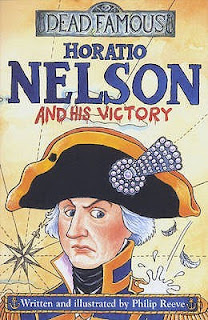This is about the British Admiral of the 18th and early 19th century, Horatio Nelson, best known for leading the British fleet to victory at the Battle of Trafalgar (the origin of the name Tragalgar Square in London, with a huge statue of Nelson) against the fleet of the Spanish and the French.
The book starts with his early life, being from an ordinary family in Norfolk with influential relatives; especially his uncle Captain Maurice Suckling because of whom young Horatio was interested in joining the navy; eventually going as a midshipman during his uncle's campaign in Falklands. The book then goes on to talk about his various campaigns; such as the one in Nicaragua, France, Italy and Spain (where he loses an eye and an arm) and the successes which made him a national hero back at home. The book also focuses on his personal life, his marriage and eventual affair with Emma Hamilton which received him negative publicity from the British public. The book then goes on to talk about his rivalry with the French icon Napoleon, and how he ended up foiling various plans of his at Egypt, Italy and finally, at the Battle of Trafalgar, where Nelson was killed in action, only to become a national symbol of the UK in future.
This book brought out the various characteristics of Nelson's personality; such as his extreme confidence in himself destined for something great, his absolute lack of modesty about his abilities, his highly conservative views such as opposition to Jacobin clubs and any rebellion against kings, and also, his love affairs. The book could also effectively be seen as a Horrible Histories book on British naval campaigns from 1780 to 1806 covering various wars that Britain was involved in during the period. I felt the illustrations in this book were particularly good, be it the depictions or the diary where Nelson records 'events' - especially where they change the handwriting to a really bad one after the loss of his right hand.
However, I felt that the book could have focused a little more on his journey till he became a captain; which was covered in a single page where it merely mentioned his involvement in Kandyan wars in Ceylon and the Anglo Mysore war in India.
On a side note, this is the second time I am reading this book and the last time I read it was seven years ago, when I was quite impressed by Nelson mainly for his determination, courage and confidence in his abilities even after his disability. However, now when I read it, what actually stood out were his extreme conservative views and his utmost regard for the king (upto which I don't have a problem) and his absolute hatred towards revolutionaries and now, apart from the other qualities, what I feel is that Nelson was part of the snobbish aristocracy in Europe who were delaying the much needed societal reform. But with all this said, I really appreciate the book for bringing out all these details and helping me form an opinion on Nelson.
On the whole, I really enjoyed reading the book, despite it being the second time and I would award the book a rating of eight on ten.
Rating - 8/10
Have a nice day,
Andy





